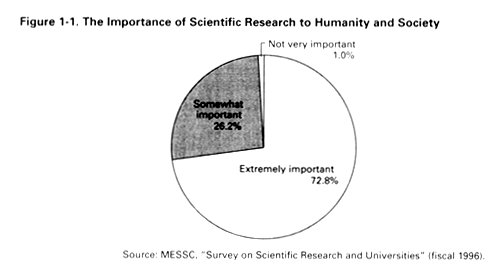| Home > Policy > White Paper, Notice, Announcement > White Paper > JAPANESE GOVERNMENT POLICES IN EDUCATION, SCIENCE, SPORTS AND CULTURE 1997 > Scientific Research Introduction 2 (1) | ||
In fiscal 1996 MESSC commissioned a questionnaire survey on scientific research and universities, which was sent to 500 randomly selected experts working in private companies, government laboratories and research institutes, and other non-university situations. The results are summarized below.
(i) The importance of scientific research to humanity and society ( Figure 1-1 ):
When asked to evaluate the importance of scientific research to humanity and society, 72.8% selected "extremely important." If "somewhat important" responses are included, almost all respondents recognized the importance of scientific research. Although people's perceptions of scientific research may vary, most accept its importance.

(ii) What is expected of scientific research ( Figure 1-2 ):
Respondents were also asked to indicate what, in particular, they expected of scientific research. The most frequent response, selected by 53.5% of survey participants, was "technological innovation." In second place was "pursuit of truth" (38.6%), followed by "solution of global problems" (37.3%). The numbers opting for "technological innovation" and "solution of global problems" were relatively high, even for a survey of non-university experts. Comparison with a similar survey conducted in 1990, when 54.4% selected "pursuit of truth" and 51.3% "technological innovation" ("solution of global problems" was not an option), points to a growing tendency to expect scientific research to focus on application and development purposes, clear evidence of change in the social and economic environment surrounding scientific research.
(iii) The roles of research in private companies and in universities ( Figure 1-3 ):
Regarding the roles of research in private companies and universities, 88.2% felt that "university research should be encouraged in order to contribute to global progress in scientific research." The selection of this response by such a large majority indicates that non-university experts consider scientific research important and expect universities to play a significant role in it.
Other views receiving strong support included "universities should actively support research by companies through joint research" (78.5%); "universities should focus not only on basic research, but also on applied and development-style research" (69.4%); and "universities should take account of the needs of business and society in their research activities" (64.6%). These results are indicative of growing hopes that universities will expand their interaction with other research institutes and increase their research activities in areas that reflect the needs of society.
These findings make it clear that in Japan in recent years people have come to expect more from scientific research. University researchers will need to respond flexibly to society's demands. Because research achievements are intellectual assets to be shared by all humanity, researchers are enjoined to make them available to society at large by publishing and disseminating them actively.
| Back to Top | MEXT HOME |